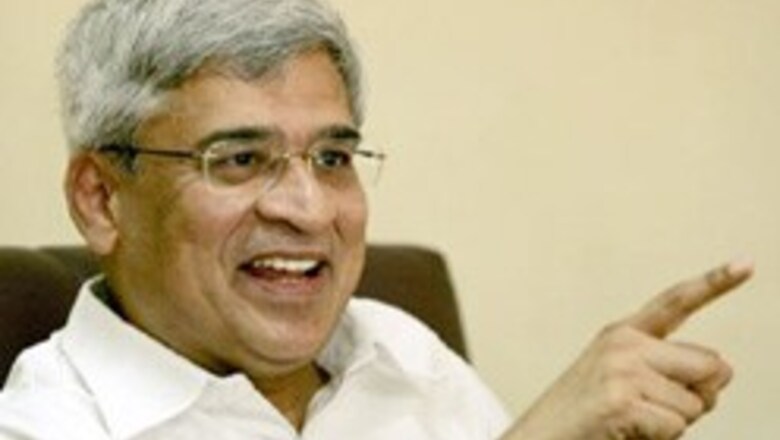
views
If Prakash Karat--the powerful general secretary of Communist Party of India (Marxist)--had his way, the Left would have withdrawn support to the United Progressive Alliance (UPA) government in 2006, a good two years before they actually did. The silver-haired Marxist ideologue wanted to pull the plug when Defence Minister Pranab Mukherjee went to Washington to sign the defence collaboration agreement with the Bush administration, much before the Indo-US nuclear deal became the bone of contention. But at that time Karat was new to his post, having been elevated as general secretary only a year before, and yet to consolidate his position within the party. It took more than two years for him to do that and mobilize the party to sever the tenuous relationship with the Congress-led UPA.
Now Karat dominates the party and nobody dare challenge his authority or disobey his command. The much controversial incident of expelling Somnath Chatterjee--the Speaker of the 14th Lok Sabha--from the CPM is a case in point. Though it created a public outcry and a handful of Bengal CPM leaders mumbled a few words of protest, Karat’s diktat went unchallenged in the party. According to insiders, when Karat mooted the proposal to expel Chatterjee at a crucial meeting of the party central committee--the highest policy-making body consisting of 82 members--there was not a single voice of dissent. In fact, members from Kerala, Tamil Nadu, Andhra Pradesh and Bengal spoke fiercely defending the general secretary. Karat had won the day without any intra-party struggle. From this position of strength he was now keen to take on the UPA.
However, before consolidating his position within the party, Karat had to make do with some compromise with the neo-liberal elements in his party. He also had to neutralise the resistance of two revered leaders, Harkishen Singh Surjeet and Jyoti Basu. Both were nursing a grudge against him for scuttling Basu’s chance to become Prime Minister in 1996. It was Karat who opposed the move invoking the party ideology. An orthodox in his thinking, Karat had his grooming in Marxism in the West like Bhupesh Gupta, Jyoti Basu and many of his predecessors. The similarity, however, ends there. Unlike them, he never worked among peasants or other working class people, nor did he involve himself in parliamentary politics. His rise to the top was smooth; through the party apparatus. Starting as a secretary to A.K. Gopalan, the CPM’s parliamentary party leader in the early seventies, he jumped into student politics at Jawaharlal Nehru University. He was inducted to the party central committee in the 1980s and made a politburo member in 1992.
PAGE_BREAK
People within the party say that Karat is so orthodox that he dislikes parliament and enjoys being an organisation man. He never even cared to visit parliament, not even to listen to the debate on the nuclear deal, an issue that was close to his heart. Instead of entering electoral politics and public life, he devoted his entire attention to party organisation. This gave him first-hand knowledge of the functioning of a communist party still steeped in a Stalinist culture. His position at the party centre brought him close to state units and the key leaders. That closeness would come in handy later when he would require their support.
This had brought to him and, to an extent to his colleague Sitaram Yechury, a unique opportunity to bring the party machinery under their control. It is important to recall that Karat and Yechury joined the central committee when senior leaders were fading away. E M S Namboodiripad, M Basavapunnaiah, H S Surjeet and Jyoti Basu, the four senior most leaders in the party were ageing. Basu was content with his role in Kolkata as the longest-serving chief minister and happily immersed himself in parliamentary politics. Basavapunnaiah died; then Namboodiripad retired as general secretary to make way for Surjeet in 1992.
After Surjeet, Karat was the automatic choice in the party. Karat’s western education and experience in Delhi put him ahead of others like Buddhadev Bhattacharya, Pinarayi Vijayan, Biman Bose and other possible contenders. Yet Karat lacked one essential qualification. He was never part of any mass movement unlike his predecessors, P. Sundaraiah, EMS and Surjeet, all of whom climbed to the top by working among masses and leading movements and agitations. But with the CPM becoming a part of the establishment in Bengal and Kerala, its two strongholds, its focus was shifting from street-fighting to parliamentary politics. Besides, the other contenders such as Buddhadev, Biman Bose and Vijayan had also come up through students’ movements. So had Karat.
In his initial years as general secretary, Karat was hesitant to push his own line. He was perceived to be running with the hare and hunting with the fox. Against his own judgment, he had to endorse a dual policy for his party on the question of pursuing development-related issues modelled after the neo-liberal economy. On the one hand, he was trying to mobilize peasants against the great land grab initiative of the corporate world for Special Economic Zones (SEZs) across the country. On the other, he gave in to the demand from the Bengal and Kerala units to go easy on the land issue in Left-ruled states. In addition, he allowed the CPM in Bengal to pursue its neo-liberal agenda without much debate. Karat was aware of the inherent contradiction in this two-pronged policy. Politburo member and trade union leader MK Pandhe and a few others who tried to oppose this were cornered while Buddhadev, Nirupam Sen and others were allowed to freely pursue their neo-liberal economic agenda. Though ideologically Karat was more close to Pandhe, he could do nothing to change the course of the party until Nandigram happened.
Even for an agnostic like Karat, police firing on unarmed peasants in Nandigram was a godsend. In March 2007, people watched in horror as the police and armed cadres of the ruling CPM brutally repressed the peasantry in Nandigram. Since similar movements against large-scale land acquisition for SEZs were gaining ground in different parts of the country, the anti-peasant role of the Left Front government in Bengal took the sheen away from its moral armour. At one stroke ‘rightists’ like Buddhadev and his ilk were cornered in the party, strengthening Karat’s position in the politburo. Immediately after that, the central committee, in the presence of Buddhadev, Nirupam Sen and Biman Bose, passed a resolution saying no such forcible acquisition of land would be allowed to take place in future. Around that time in May 2007 Karat admitted to this correspondent that Nandigram had caused a major damage to the Left’s prestige throughout the country.
The two basic elements at the core of Karat’s politics are anti-Americanism and a stress on increase in public spending on state and social sectors instead of leaving the field to market forces. The more the UPA government aligned itself with the Bush administration, the more it made Karat hostile. That he did not succeed in stopping the Indo-US nuclear deal made Karat more determined to make it difficult for the UPA to return to power. Thus Karat started playing a role, which was earlier reserved for Surjeet, and subsequently for Yechury, to cobble up a coalition of anti-Congress forces.
He took the initiative of wooing Jayalalithaa in Tamil Nadu and Chandrababu Naidu in Andhra Pradesh to form a pre-electoral alliance of regional forces of divergent political ideologies and the Left. Even though Buddhadev Bhattacharya is still reluctant to rule out any possibility of forming an alliance with the Congress, Karat is likely to put up a stiff opposition to it. He would rather see the Congress supporting the so-called ‘Third Force’ to form a government, denying BJP any chance to make a bid for power. If the numbers do not favour the Left to push for this agenda, then Karat would be happy to sit in opposition. He has a strong ally in CPI general secretary AB Bardhan, who puts it succinctly, “If it comes to that, let them (Congress) run a minority government, we don’t want to be a part of it”.
With near-complete control over the party apparatus, Karat is likely to pursue his anti-American agenda with renewed vigour. He may ask for strengthening the public sector and more regulatory control of the market. Ideologically, the Left could not have prayed for better times as the world over there is a strong tilt toward protectionism and state control to fight one of the worst recession of all times.
Expectedly, all political parties are vying with one another to present economic solutions to voters in the ongoing elections. After 62 years of independence, the focus is back on the virtues of having the public distribution system in place and legislation to ensure food security and other measures o safeguard the weaker sections of the society. Karat, the orthodox Marxist that he is, would like to make the most of the situation, no matter whether the CPM sits on treasury benches or in opposition in the 15th Lok Sabha.
(Rajat Roy is a Kolkata-based freelance journalist and commentator. )


















Comments
0 comment